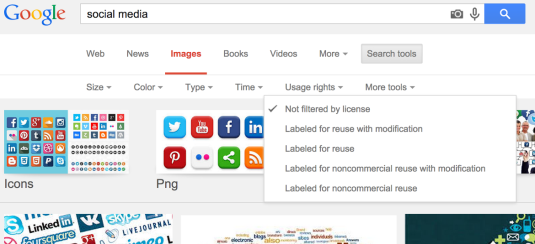Is Your Social Media Content Infringing on Copyright Laws?
 Keeping up with all the social media accounts for a business can be a time consuming job. Managing multiple accounts myself, I find that sometimes I need to post something quickly. It is much easier to go to Google Images and find a picture that fits the theme of the post, rather than taking a photo myself. Doing this, though, may be infringing on copyright laws. Instead of having a bank of photos, videos and content to use, I frequently see businesses using content that is not their own. Often times people are unaware of social media copyright issues.
Keeping up with all the social media accounts for a business can be a time consuming job. Managing multiple accounts myself, I find that sometimes I need to post something quickly. It is much easier to go to Google Images and find a picture that fits the theme of the post, rather than taking a photo myself. Doing this, though, may be infringing on copyright laws. Instead of having a bank of photos, videos and content to use, I frequently see businesses using content that is not their own. Often times people are unaware of social media copyright issues.
Social media copyright issues
Social media websites have millions and millions of users who share and create content everyday. We are all the creators of unique content when we post on our pages, and when we aren’t doing that, we’re sharing other’s content.
Copyright infringement and sharing other’s content is less of a worry on our personal pages, but on a business’s social media page, using copyrighted material can be detrimental. Just because something does not have the copyright C (see picture) doesn’t mean it isn’t copyrighted. The moment you (or anyone else) create something, you own the rights to it. Many social media websites’ user agreements outline intellectual property rights, which state that the users retain all rights and are responsible for the content the user posts. This means you are responsible for the material you are posting. Ignoring these laws can result in lawsuits, or cease and desist notifications. The laws surrounding this issue are still developing, but I imagine there will be more guidelines to follow in the future.
What are a few common misuses?
- Unauthorized use of content (photos, videos, text) without attribution
- Unauthorized use of a trademark
- Unauthorized use of copyright protected content
- Sharing content without proper linkage to the source
Solutions
Use Creative Commons licensed work. Creative Commons allows the legal use and sharing of creative work. Their database can be used to find videos, songs, photos and more. There are other places to find Creative Commons work, like Flickr, Google and SoundCloud.
Use Google Images. To the right of the word Images is a link that says, “Search tools”.. Once this link is clicked there are several options to choose from, like size and usage rights. When the arrow is clicked down on the usage rights there are a few different options. The “labeled for reuse,” or the “labeled for reuse with modification” should be used.

It would not hurt to read over the law, such as The Digital Millennium Copyright Act. Also, know what is considered Fair Use.
Most importantly, give credit where credit is due. If you take something from another website or person, make sure to give them the proper credit.
Not only is it important to know the copyright laws and avoid infringement on social media pages, it’s also important to take a good look at your website for potential copyright infringement.
Keep in mind Thou Shall Not Steal! Creating original content is the best way to prevent copyright infringement. If you need advice or help with creating original and unique content, we can help.
If you enjoyed this post by Elizabeth, check out some of her other blogs!
Elizabeth Muckensturm – Communications and Media Professor



